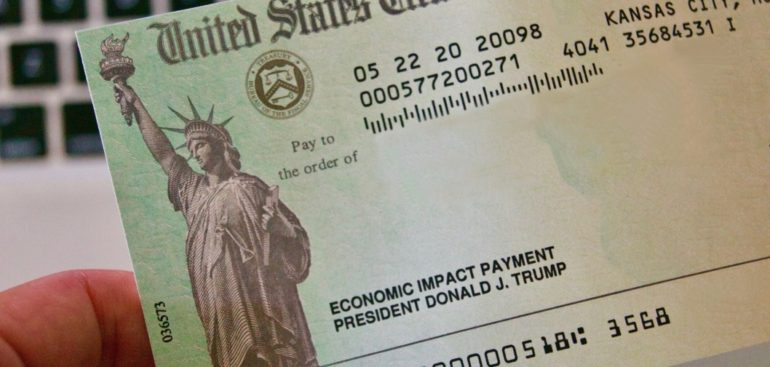Your taxes determine whether you get a stimulus check or not, even if you do not file at all. Below are some commonly asked questions about stimulus checks and how they may or may not affect your tax return.
What do I need to qualify for a stimulus (or economic income payment) check?
You need to have a valid SSN (Social security Number) and not be a dependent of somebody else. It is also paramount that you meet the following income eligibility requirements to receive 100% payment:
- Joint tax filers (income up to $150,000).
- Head of households (income up to $112,500).
- Individual tax filers (income up to $75,000)
If the AGI (adjusted gross income) exceeds the applicable threshold, the total payment amount is reduced by 5%.
Who is NOT eligible for the stimulus checks?
Joint filers with no offspring and income more than $198,000, and single filers earning over $99,000.
How much money will I get from a stimulus check?
The first stimulus check was $1200, and the second was $600. Also, taxpayers that have filed their 2019 tax returns will get up to $1,200 (married couples) and up to $600 for every eligible child or up to $600 (individual filers) automatically.
Will I need to submit an application to receive the stimulus check?
No, this is not required. The process is automated for those that qualify. The IRS will calculate your payment after using your tax return information. You will then receive the payment on the same bank account from the tax return. In any other case, the IRS will send you an Economic Income Payment (EIP) card, which is a type of debit card, using the most recent mailing address filed with them.
The bank account on my 2019 tax return is closed/inactive. Where will I receive the payment?
You will need to file your 2020 tax returns electronically. Then, claim the Recovery Rebate Credit on your tax return.
I have not received my payment. What should I do?
You can claim the Recovery Rebate Credit when filing your 2020 income taxes. Then, you will get a voucher for your 2020 tax return as a credit, saying that your stimulus is part of your tax return refund money.
How are vouchers different from checks?
The voucher makes the stimulus money part of your refund, whereas checks go to everybody even if they owed the IRS money. This also means that the IRS can keep the voucher if you owe them tax money, as it (the voucher) is part of the return.
What if I have received the wrong amount?
Again, initiate the procedure to get the Recovery Rebate Credit when filing your 2020 income taxes.
I don’t have a bank account. How will I receive the payment?
You can expect your payment to be made by check or a prepaid debit card. The IRS will use the mail address on your file (the most recent tax return) to send you the payment. For more information about your EIP card or report a stolen/missing EIP card, you can visit this link.
I am not required to file a tax return. Will I get any money?
Yes. Those not required to file a tax return will receive payments generated by the IRS, provided they have used the RRB-1099 or the SSA-1099 form before November 2020. Otherwise, the Recovery Rebate Credit can be claimed on your 2020 tax return (line 30).
When are stimulus payments made?
Stimulus payments started in late December 2020. Those that have direct deposit details on file will be paid first. Mailed payments (debit card and checks) are the next in line. You may use this link to check the status of your payment. If you have NOT provided the IRS with your banking information, visit this online portal so you can do whatever necessary to receive immediate payments rather than checks in the mail.
I have missed the deadline to file a claim for the 1st stimulus check? Now what?
Non-filers that have missed the November 21st deadline to provide their personal details to claim the 1st stimulus check can claim the additional sum after filing their 2020 tax return.
Is my stimulus payment taxable?
According to the IRS, taxpayers are not required to owe tax on their stimulus payments, as they (the payments) are not regarded as income. This also means that your refund will NOT be reduced or otherwise affected by the payment. Plus, the stimulus payments will NOT raise the due sum when you file your 2020 tax return (or your 2021 tax return). Finally, stimulus payments will NOT have any impact on your income for purposes of determining your eligibility for benefit programs or federal government assistance programs.
Is a stimulus payment a tax credit?
Technically, yes. However, it is not your average tax credit as it won’t reduce your future tax refund or generate a larger tax bill when you file your tax return the following year. Here is some more explaining. In the tax world, a tax credit lowers your tax bill. So, if you owe $1,700 in federal income taxes and receive a $900 tax credit, your total due amount drops to $800 ($1,700-$900). Now, a refundable tax credit can turn your tax bill into a tax refund. Therefore, if you owe $1,500 in taxes and have a refundable tax credit of $1,900, you will receive a $400 tax refund.
Given that you do not wait to receive money from the credit in 2022 (when you file your 2021 tax return) but are getting sums to a refundable tax credit now in the form of a stimulus payment (the 3rd one) instead, you are actually receiving an advanced refundable tax credit.
The stimulus payment was more than I was allowed. What happens now?
Any adjustments to your 2020 tax returns rebate are in your favor. If, for instance, the IRS has calculated your stimulus payment based on your 2019 tax return (you had a lower income then), but your income is higher this year, then you won’t need to pay the credit back.
I owe federal taxes. Will the IRS use my stimulus check money to cover them?
If you have past-due child support, the IRS will NOT use your stimulus payment to cover it. This also means that your stimulus payment can NOT be garnished by debt collectors. This applies to the second check, though.
Nevertheless, if you are claiming your missing stimulus check on your tax returns, you are no longer protected from the Consolidated Appropriations Act. In other words, the IRS can, in this case, garnish your stimulus check for unpaid taxes.
So, all in all, if you have qualified for EIP and have not received your full payment (and have outstanding debts), the IRS will withhold some or all of your unpaid stimulus payment to offset those debts.
I have unemployment income. Do I pay taxes on it?
According to the new guidelines, up to $10,200 is tax-exempt. So, if you collected unemployment in 2020, you could be exempt from paying taxes on it if you meet the criteria of the economic impact/stimulus. For married individuals filing jointly, the adjusted gross income is set at $150K while for singles, it is $75K.
How much money will I get from the 3rd stimulus, based on my 2020 taxes? Will they affect the amount I will receive?
If your situation has changed dramatically between 2019 and 2020, you may receive the full amount of the third stimulus check, which is based on your 2020 or 2019 taxes (depending on what the IRS has on file when it determines the amount you will receive). However, tax season could affect your 3rd check, as you may need to be patient until next year (2022) to claim the difference in the taxes. Truth be told, things are quite complicated with the third stimulus at the moment, considering that the tax season merges with the timeline for sending the check.
What if I file for an extension or wait until the April 15 tax due date?
Having to pay owed taxes will NOT be postponed if you file for an extension. Doing this will delay your stimulus payment. In general, it is advised to file your taxes sooner than the due date for your 2020 tax returns as it could speed up the delivery of any tax refund you might be eligible for. On top of that, you will help boost the process of getting any missing stimulus money by weeks or even months.
I have already filed my 2020 tax return. How will the government rectify my tax bills?
Unfortunately, the current landscape is blurry in regards to this particular situation. It is still unclear how the IRS will address this issue, at least at the moment of this writing.
I have received a stimulus payment on behalf of a family member that has deceased. What do I do?
If you filed jointly with your spouse, and they have passed away before January 1, 2020, then the IRS will not issue a payment for the deceased spouse. This means that you won’t get the $600 payment for them. However, you will continue to receive up to $600 for you and an additional $600 for any qualifying offspring (provided you meet all the other eligibility criteria).


